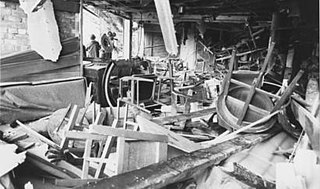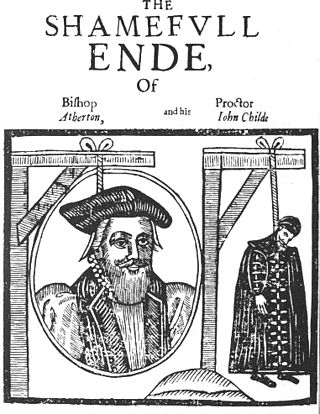In jurisprudence, double jeopardy is a procedural defence that prevents an accused person from being tried again on the same charges following an acquittal or conviction and in rare cases prosecutorial and/or judge misconduct in the same jurisdiction. Double jeopardy is a common concept in criminal law - in civil law, a similar concept is that of res judicata. The double jeopardy protection in criminal prosecutions only bars an identical prosecution for the same offence, however, a different offence may be charged on identical evidence at a second trial. Res judicata protection is stronger - it precludes any causes of action or claims that arise from a previously litigated subject matter.
A hate crime is crime where a perpetrator targets a victim because of their physical appearance or perceived membership of a certain social group.

The Birmingham pub bombings were carried out on 21 November 1974, when bombs exploded in two public houses in Birmingham, England, killing 21 people and injuring 182 others.

The Probation Service for England and Wales is a statutory criminal justice service, mainly responsible for the supervision of offenders in the community and the provision of reports to the criminal courts to assist them in their sentencing duties. It was established in its current form by the Criminal Justice and Court Services Act in April 2001, but has existed since 1907 as a set of area-based services interacting at arm's length with central government.
Victim blaming occurs when the victim of a crime or any wrongful act is held entirely or partially at fault for the harm that befell them. There is historical and current prejudice against the victims of domestic violence and sex crimes, such as the greater tendency to blame victims of rape than victims of robbery if victims and perpetrators knew each other prior to the commission of the crime.

Bible John is an unidentified serial killer who is believed to have murdered three young women between 1968 and 1969 in Glasgow, Scotland.
Witness tampering is the act of attempting to improperly influence, alter or prevent the testimony of witnesses within criminal or civil proceedings.
Native American women encounter a disproportionate level of sexual violence from verbal abuse to physical harm, including but not limited to domestic and sexual assaults. Such violations not only result in lasting detrimental effects on the individuals subjected to them but also reverberate throughout their entire community, exacerbating social challenges.
Capital punishment is a legal punishment in Iran.
Crime in the United Kingdom describes acts of violent crime and non-violent crime that take place within the United Kingdom. Courts and police systems are separated into three sections, based on the different judicial systems of England and Wales, Scotland, and Northern Ireland.
Cadoxton, is a village situated in Neath Port Talbot county borough, Wales. Cadoxton is located just outside the town of Neath and borders the villages of Cilfrew and Bryncoch. The village has 1,684 residents and is located in the Cadoxton ward. Cadoxton elected a Liberal Democrat representative in the 2008 council elections.

The Criminal Injuries Compensation Authority (CICA) is an executive agency of the UK Government. The Authority, established in 1996 and based in Glasgow, administers a compensation scheme for injuries caused to victims of violent crime in England, Scotland and Wales. It is funded by the Ministry of Justice in England and Wales and the Justice Directorate in Scotland. The current Chief Executive is Linda Brown.

Gibbet Hill, at Hindhead, Surrey, is the apex of the scarp surrounding the Devil's Punch Bowl, not far from the A3 London to Portsmouth road in England.
Stoneykirk is an area and a village in the heart of the Rhins of Galloway, Wigtownshire, in the administrative council area of Dumfries and Galloway, Scotland nearly 10 miles (16 km) in length and 3+1⁄2 miles (5.6 km) in breadth, bounded on the east by the bay of Luce, and on the west by the Irish Channel, 5 miles (8 km) south of Stranraer.
The Sjeverin massacre was the massacre on 22 October 1992 of 16 Bosniak citizens of Serbia from the village of Sjeverin who had been abducted from a bus in the village of Mioče, in Bosnia. The abductees were taken to the Vilina Vlas hotel in Višegrad where they were tortured before being taken to the Drina River and executed. Members of a Serbian paramilitary unit commanded by Milan Lukić were convicted of the crime in 2002.
Stalking is unwanted and/or repeated surveillance or contact by an individual or group toward another person. Stalking behaviors are interrelated to harassment and intimidation and may include following the victim in person or monitoring them. The term stalking is used with some differing definitions in psychiatry and psychology, as well as in some legal jurisdictions as a term for a criminal offense.

The history of violence against LGBT people in the United Kingdom is made up of assaults on gay men, lesbians, bisexual, transgender, queer and intersex individuals (LGBTQI), legal responses to such violence, and hate crime statistics in the United Kingdom. Those targeted by such violence are perceived to violate heteronormative rules and religious beliefs and contravene perceived protocols of gender and sexual roles. People who are perceived to be LGBTQI may also be targeted.
Victims' rights are legal rights afforded to victims of crime. These may include the right to restitution, the right to a victims' advocate, the right not to be excluded from criminal justice proceedings, and the right to speak at criminal justice proceedings.
Clare's Law, often known officially as a Domestic Violence Disclosure Scheme or similar, designates several ways for police officers to disclose a person's history of abusive behaviour to those who may be at risk from such behaviour. It is intended to reduce intimate partner violence. Clare's Law is named after Clare Wood, a woman murdered in England by a former domestic partner who police knew to be dangerous.
On September 18, 2021, a fatal attack with a firearm on the 20-year-old employee of a gas station was carried out in Idar-Oberstein, Germany. The perpetrator, a 49-year-old man, had been requested by the employee to wear his surgical mask as mandated by the German government in response to the COVID-19 pandemic. The shooting received a lot of public attention and was related by some to the increasing radicalization of the so-called Querdenken movement or to the recent rise of right-wing conspiracy theories, while criminal psychologists pointed to the possibility that the shooter may have been driven by personal or psychological problems. In September 2022, the perpetrator was convicted of murder and sentenced to life in jail; both prosecution and defence lodged appeals against the verdict.







